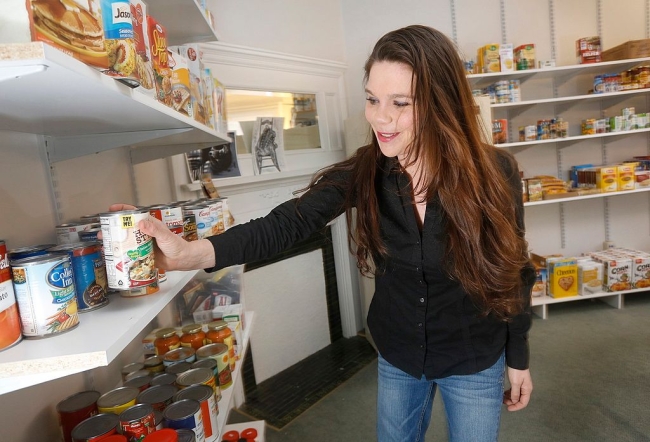You have /5 articles left.
Sign up for a free account or log in.

Leanna Shields organizes items on the shelves at the Captain's Cupboard Food Pantry on the Southern Maine Community College campus in this 2014 file photo. Advocates say that food pantries aren't enough to combat food insecurity on campus.
Getty Images / Derek Davis of the Portland Press Herald
Upcoming changes to the Supplemental Nutrition Assistance Program, the federal food stamp program, are expected to affect nearly 700,000 Americans.
College students -- among the neediest -- will be among them.
Some higher education policy experts argue that it's already complicated for students to decipher whether they qualify for public benefits, and the rule change from the U.S. Department of Agriculture, which runs SNAP, scheduled to take place in April will only make matters more difficult.
Students who are enrolled at least half-time wouldn't be affected by the rule change, but those who are enrolled less than half-time could lose access to the benefits. These students are subject to time limits, meaning they can't receive benefits for more than three months during a three-year period unless they work at least 20 hours per week. States can waive the time limit when unemployment is high, but this change would make that more difficult.
For example, Pennsylvania lets students count taking college classes toward the work requirements, according to Carrie Warick, director of policy and advocacy at the National College Access Network. It's unclear if that waiver will be allowed once the rule change is implemented.
"The SNAP eligibility for students is really confusing already," said Parker Gilkesson, a policy analyst at the Center for Law and Social Policy. The rule change would only "add confusion" to a program that's underutilized, as only four in 10 eligible students are enrolled in SNAP, she said.
The students most affected by the change -- those attending less than half-time -- are also likely those who need the benefits the most, according to Warick.
These students "most likely still need to work to support families, and therefore it’s taking them a long time to finish a degree, which means the ability to increase earnings is delayed," Warick said.
While it's unknown exactly how many students this change would affect, advocates see this as yet another hurdle for students to get the help they need to complete their degrees.
"Would you be able to study or look for a reputable job if you’re hungry? No," Gilkesson said. "We shouldn’t be using work as a means to justify if someone can get a necessity of life."
While the estimated rate of food insecurity on college campuses varies across studies, there's agreement that it's a problem.
Some colleges attempt to assuage the issue with food pantries and one-stop service centers, but some say that is a short-term solution.
For every one meal food banks provide, SNAP provides 12, according to Victoria Jackson, senior policy analyst for higher education at the Education Trust.
"We really should be looking at SNAP and better, more comprehensive financial aid policies," Jackson said.
Warick said she would like to see the required work hours reduced, as students who work 20 hours or more per week are more likely to fall behind in their classes. It can also be difficult to maintain those hours, as part-time jobs often have inconsistent scheduling, she said.
Policy makers and the Department of Agriculture also need to understand who today's students are, Jackson said. Eligibility requirements for college students were designed with the idea of 18-year-olds who went to college straight from high school and can depend on their parents for help. But that's often not the case today, as many students are older, parents, low income or all of the above.
"It’s so important that, in this time when SNAP and other public benefits programs are being attacked, that we really put the message out there that people need food, health care and cash to be able to live, thrive and operate in this world," Gilkesson said. "Until we change our mind-set about how we look at public benefits in this country, we will not be able to help people with their real need."








